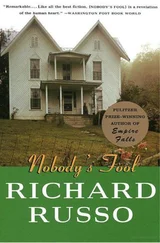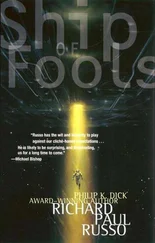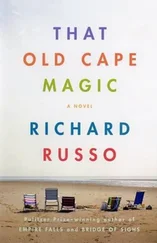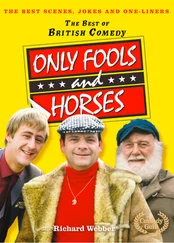“I’m glad it’s not,” Sully told her. “If it was, I’d know how to deal with it, though.”
“I ask,” Carl was saying, still single-minded, “because I think about it every ten seconds or so. It’s worse now than before.” By this he meant before the recent prostate surgery that had left him, for the time being at least, both impotent and incontinent without — he maintained — diminishing in the slightest either his sex addiction or his ability to pleasure women. The existence of said addiction was something Sully had yet to concede, though he and Carl had been debating it since the night almost a decade earlier when Carl had come into the Horse with a rolled-up magazine and swatted Sully on the back of the head with it by way of hello. Climbing onto an adjacent barstool, he’d opened the magazine to the article he wanted him to read, smoothing it out for him on the bar. “You know what I am?” he said, his usual smug expression amplified.
“Yes, I do,” Sully said, without looking at the magazine. “In fact, I’ve told you what you are on several occasions. You must not’ve been listening.”
“According to this,” Carl said, stabbing the magazine with his forefinger, “I’m a sex addict. It’s a medical condition.”
“What you are,” Sully assured him, “is an anatomical description.”
Sully’s friend Wirf, who happened just then to occupy the stool on Sully’s other side, was apparently intrigued, though, because he took the magazine and began reading.
“And I’ll tell you something else,” Carl continued. “According to medical experts, what I deserve is sympathy.”
“Wirf,” Sully said, rotating on his barstool to better observe his friend, who continued to read carefully. “What do you think Carl deserves?”
That rare lawyer who was less interested in law than justice, Wirf took even joking references to the latter seriously and could always be counted on for both perspective and sound judgment. “A dose of the clap,” he said after a moment’s reflection. “Also, perhaps, the grudging admiration of men like me and you.”
Carl and Wirf then clinked beer bottles across Sully, leading Sully to regret, as he often did, drawing his unpredictable companion into barroom arguments.
“Sully’s just jealous,” Carl observed when Wirf went back to reading the sex-addiction article, “because stupidity isn’t classified as a medical condition.”
“Actually, I believe it is,” said Wirf, not looking up.
“But not one worthy of sympathy.”
“No.”
“Or respect.”
“Certainly not.”
Poor Wirf. To Sully’s mind, the world had been less just and true since he left it. Also less fun. “When I’m gone,” he’d told Sully more than once, “you’re going to discover how hard it is to find another one-legged lawyer who’s always in a good mood,” and this had proven true.
“Of course you think about sex every ten seconds,” Sully told Carl now. “You stay up all night watching porn.” Since losing his house, Carl had been living in Sully’s old apartment over Miss Beryl’s. When Sully, who now lived in the trailer out back, got up to pee in the middle of the night, he could see lewd images reflected in Carl’s upstairs window.
“I like porn,” Carl said, with the resigned air of a man who’d long ago given up trying to even understand his own behavior, much less modify it.
Sully didn’t doubt that he did enjoy porn, but he guessed there was more to it. Carl’s urologist had warned him it could be anywhere from six months to a year before he could achieve erections again, and there was no guarantee even then. He suspected it was mostly fear that drove Carl to sit up half the night watching smut, ever on alert for a stirring in his boxers.
“The production values are getting better,” Carl continued. “Ruth? Tell him I’m right.”
“Hey, Ma?” Roy Purdy called from down the counter. “If it’s between me and the garbage can, I’d eat that last piece of day-old.”
This was in reference to the single slice of cherry left in yesterday’s pie dish. Sully couldn’t help smiling at Roy’s tactic. Begging for something even as you establish that it’s of no value means you’re not only more likely to get it but also — and here was the real beauty — you wouldn’t owe much of a debt of gratitude to the person who gave it to you.
“Throw it away,” Sully advised, loud enough for Ruth, and maybe Roy, to hear.
The effect of this was both predictable and immediate. Ruth slid the pie onto a saucer and banged it down in front of her son-in-law, arching her eyebrow at Sully so there’d be no mistaking the consequence of his opening his big fat mouth. “I’d eat that dry ole piece of crust too,” Roy told her, pointing a yellow finger at the shard of pastry burned to the dish.
“They didn’t feed you downstate?” Ruth said, prying it loose with a knife.
Roy dug in, using his fork like a small shovel. “Not well,” he said around a mouthful of pie, “and that’s for true.”
Carl leaned toward Sully and lowered his voice confidentially. “Earlier? I couldn’t help noticing that when I explained how it’s worse now than before, Ruth didn’t say before what? Don’t you find that strange?”
“I find you strange,” said Sully, who knew where this was heading.
“Because that would’ve been the obvious question, unless she already knew what I was talking about.”
“Hey, Dummy. Look at me. I never told anybody. You did.”
The night before his procedure Carl had come into the Horse and told Sully about it, swearing him to secrecy. After Sully went home, though, Carl had gotten drunk and told a dozen other men, as well as Birdie, the bartender, which meant that the next day, even before the anesthesia wore off, Carl Roebuck’s broke-dick plight was common knowledge, the talk of the town.
Not that Sully hadn’t been tempted to tell. After all, Carl’s legendary inability to keep his dick in his pants had ruined several marriages, including his own. Sully’d told him as much that night at the Horse. “Half the married men in Schuyler County are going to see this as simple justice. You do know that, right? You’ve heard of karma?”
“Like when bad things happen to good people?”
“No, like when what goes around comes around.”
“Yeah?” Carl shrugged. “Well, I hope I’m there when it comes around for you.”
“It already has,” Sully assured him. “What you’re looking at is the result.”
Though in truth, he hadn’t been sure then and still wasn’t now, even after the VA diagnosis. Had he gotten off easy? During the war he’d somehow managed to be standing in the exact right place while more talented men and better soldiers happened to be standing in the exact wrong one. Often that was right next to Sully. For a while there on Omaha Beach there’d been a new, utterly lethal lottery every few seconds. Through diligence and judgment and skill you could improve your odds of survival, but not by much. All the way to Berlin, the calculus of pure dumb luck had ruled, Sully its undeniable beneficiary.
But that had been war. When the shooting finally stopped and the world returned to something like sanity and he again had the leisure to reflect, things felt different. There were days he couldn’t help feeling fucked with. If there was a God, his primary source of amusement seemed to be toying with all the poor little bastards he’d without invitation created. Carl himself was a case in point. Give a man a dick, arrange things so that it rules his life, then poison the little gland that makes the dick work and watch what he does. Seen from God’s point of view, maybe this was just good sport, a fleeting release from the monotony of omnipotence. Because if you were God, it stood to reason your real enemy would be boredom. Sully remembered as a kid studying ants on the sidewalk out front of the family house on Bowdon Street after he’d finished eating a melting Popsicle. Hundreds of the little fuckers, maybe thousands, all programmed to perform in unison a task Sully couldn’t fathom. From their well-ordered ranks, he’d select a single ant and prevent it from doing the one thing it clearly wanted to, forcing it left or right with his Popsicle stick, farther and farther away from the moving current of its fellows, marveling that its tiny brain was incapable of processing what was happening. The only sensible play would be to abandon the struggle until the giant who was thwarting its purpose became disinterested and moved on, probably to torment some other poor creature, but clearly the ant was not programmed to desist. It wanted what it wanted. So maybe God was just a kid with a stick — vaguely curious but incapable of empathy for anything so small and insignificant. From Carl Roebuck he’d stolen a tiny gland. From Wirf, he’d first demanded a leg and then, finding the man undiminished, had taken his life. That’d teach him.
Читать дальше












